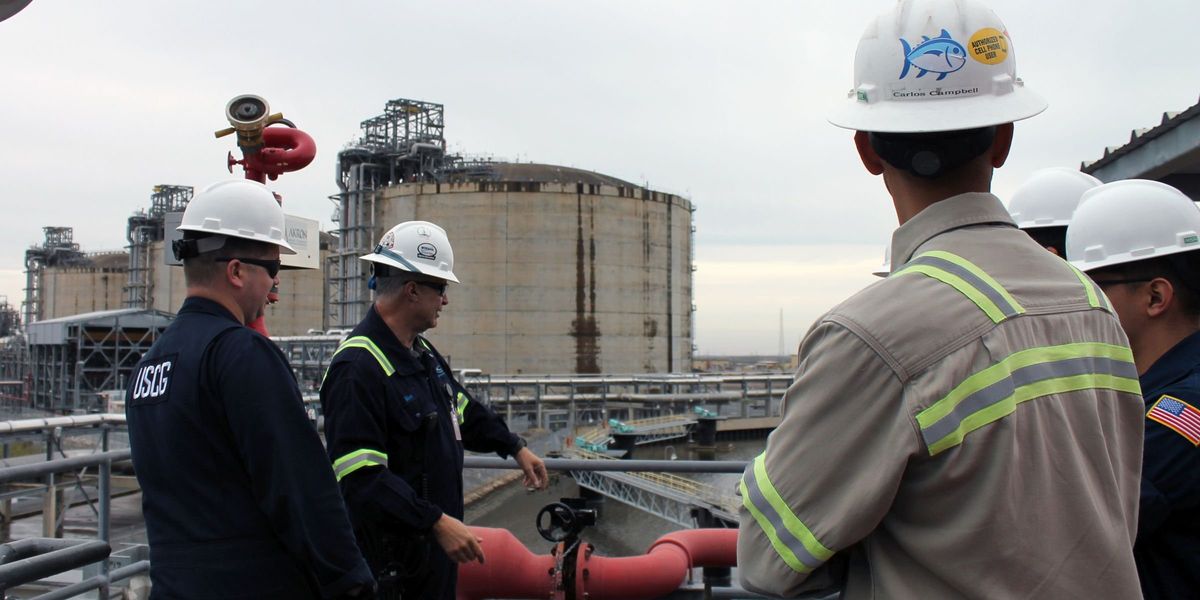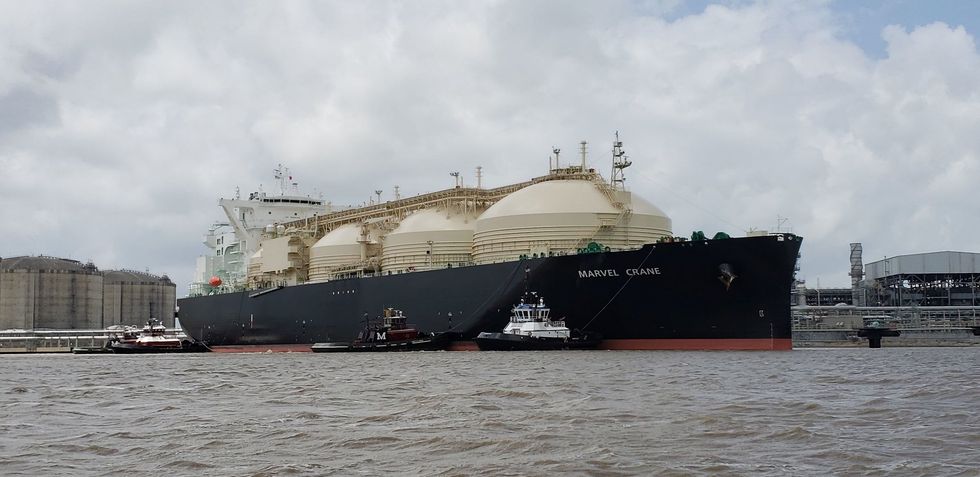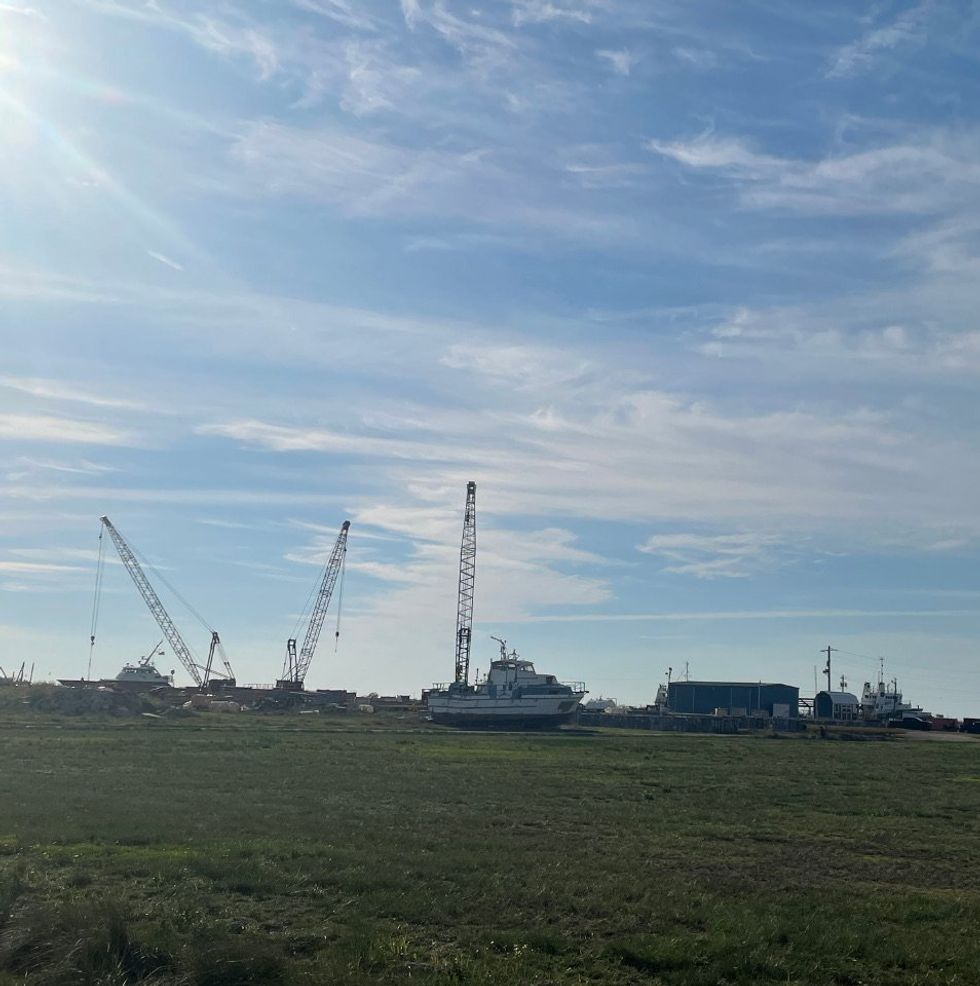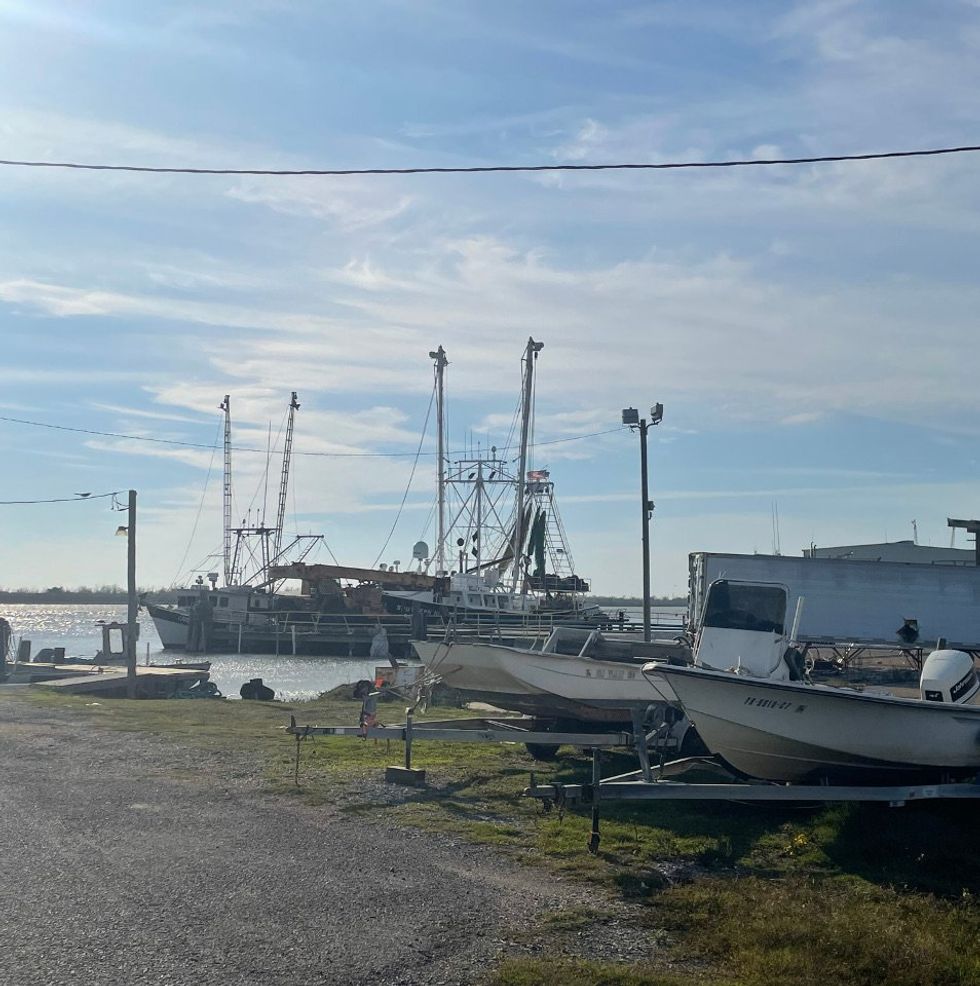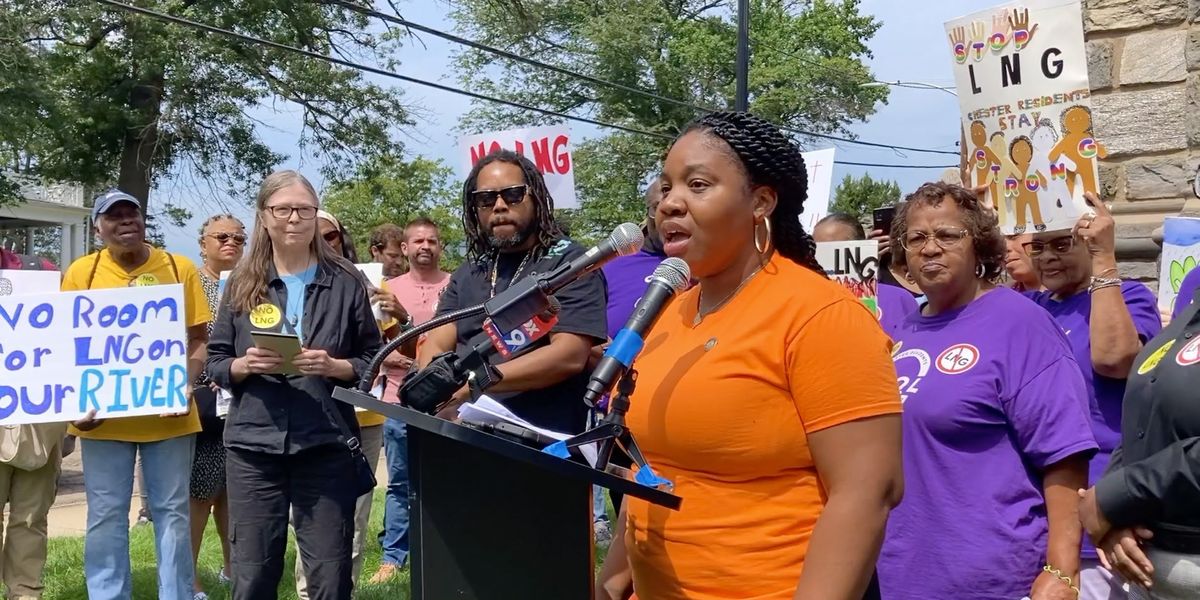
Majority-Black Pennsylvania community fights back against proposed $6 billion LNG terminal
“There’s no place to put it that is not going to be an unbearable, intolerable burden for the people who live near it.”
Bonnie Waites remembers how Chester sounded years ago, before the incinerator came to town in 1992, bringing the seemingly endless rumble of waste trucks into this small city in southeastern Pennsylvania, just down the Delaware River from Philadelphia.
Back then, she and her neighbors could hear the clear call of the church bells ringing down the street at St. Hedwig’s.
“Everything was beautiful,” Waites told Environmental Health News (EHN). “You could hang your clothes outside on the lines. The kids could play. We had a playground and a swimming pool. But you can’t sit outside now.”
In what was once a proud and neighborly community where residents sat on their porches and looked after kids playing in the streets, the noxious smell and degraded air quality attributable to the Covanta waste incinerator — the largest in the country, burning as much as 3,500 tons of trash a day — have driven residents indoors or out of town. The city’s population, which is 72% Black, has dwindled by 20% in the past three decades, falling to about 33,000. Many who remain suffer from health problems linked to the incinerator and other industrial facilities, including the Delcora sewage treatment facility, a Kimberly Clark paper mill and a PQ Corp. chemical plant, all of which have a history of pollution. The Covanta facility alone emits as much as 200,000 pounds per year of particulate matter 2.5 (PM2.5), a pollutant that contributes to respiratory illness, diminished lung function and is even linked to cancer. Childhood asthma rates in the city are at least three times higher than the national average.
In the same year the incinerator came to town, the community formed Chester Residents Concerned for Quality Living, an organization advocating for clean air, community health and environmental justice. The organization has had its hands full for more than 30 years, fending off a range of efforts to heap more industrial weight upon Chester’s shoulders, including a soil remediation plant, a proposal to burn tires for energy and a Thermal Pure Systems facility treating infectious medical waste. Now, as Penn America Energy seeks to capitalize on Pennsylvania’s abundance of shale gas by building a $6.4 billion liquefied natural gas terminal on the city’s waterfront, residents are fighting back once more. Their impassioned pleas to keep the LNG plant out of Chester reflect fears of the potential disaster that follows a leak at such facilities and concerns about the assortment of pollutants they emit, from PM2.5 and particulate matter 10 (PM10) to nitrogen oxides, sulfur dioxide, carbon monoxide and a host of volatile organic compounds.
The final report of a state task force that examined the feasibility and impact of the proposed LNG facility is expected as soon as November, according to a spokesperson for state Rep. Martina White, the task force’s Republican chair, who declined to comment until the report is released. Penn America’s proposal projects $3 million in annual tax revenue for Chester during a four-year build-out phase and $13 million per year once the site is operational. The city, which is in bankruptcy, has an operating budget of $61 million. The proposal also projects nearly 8,000 jobs to be created during build-out and around 3,000 once operations start.
Community members anticipate a report that supports Penn America’s ambitions, given White’s leadership of the bipartisan task force and the fact that it includes representatives of the oil and gas industry and local unions that would benefit from its development. Rep. Joseph Hohenstein, a Democrat on the task force who is preparing a minority report, told EHN Chester residents’ refusal to accept the potential harms and hazards of yet another industrial facility is a “turning point” in the city’s history.
“We are resilient people,” Zulene Mayfield, Chester Residents Concerned for Quality Living’s leader, told EHN. “We are going to be the determining factors as to what’s going to happen in our community and to our people. Our biggest victory is that after 30 years we rise up every time for the fight. We’ve come up against multibillion-dollar corporations and we don’t back down. You cannot scare us and you cannot buy us.”
‘An unbearable, intolerable burden’
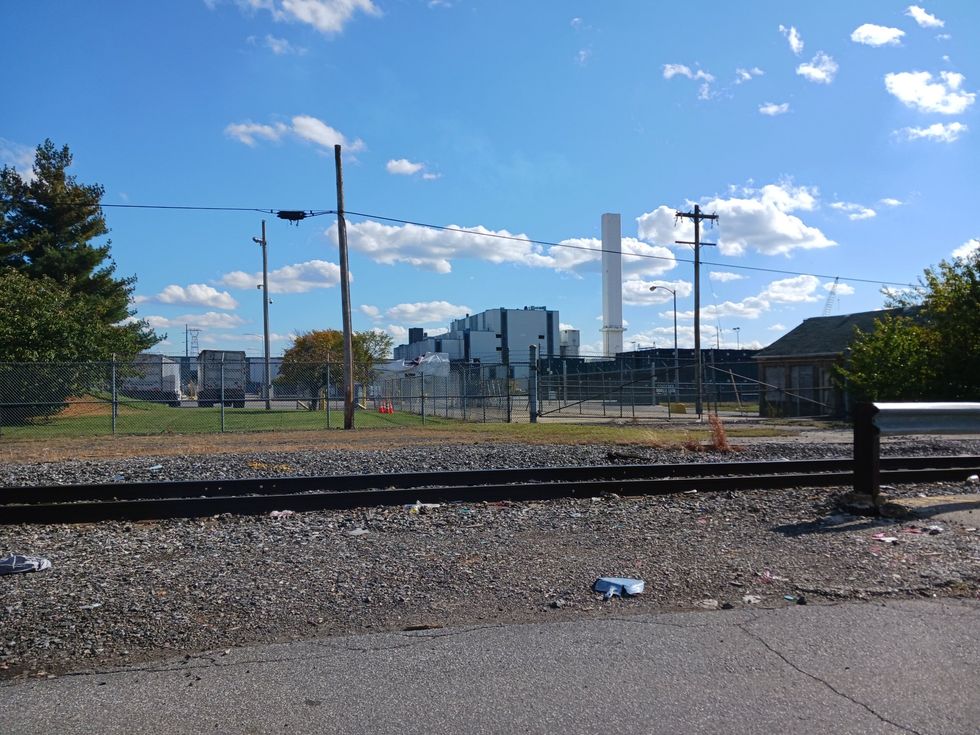
The Covanta waste incinerator, the largest in the country, burns as much as 3,500 tons of trash a day.
Credit: Zulene Mayfield
Penn America’s proposal, which was discussed with state and local officials for five years before the public learned about it, would build a liquefaction facility on 100 acres of land along the Chester waterfront to support the export of 7 million tons of LNG each year. It would require new pipeline to carry natural gas from the Utica and Marcellus shale fields in the Appalachian basin. The gas would then be cooled down to minus-260 degrees Fahrenheit to be shipped out in its liquid state as part of a broader U.S. push to dominate the LNG export market, with backing from the Biden administration.
A new LNG facility and terminal would impact the entire region because of the infrastructure required to operate it and the environmental degradation it would cause over time, according to Tracy Carluccio, deputy director of the Delaware Riverkeeper Network, an environmental group that has been fighting a proposed LNG export terminal in Gibbstown, New Jersey, just across the river, since 2019. It would also bring significant safety concerns, she told EHN, given that LNG expands more than 600 times in volume as soon as it escapes its container, creating the potential for an enormous and highly flammable vapor cloud if anything goes wrong. In the case of a leak, even something as simple as someone starting their car or lighting a cigarette could ignite such a cloud, releasing “a fearsome amount of energy,” Fred Millar, an environmental consultant on the transportation of dangerous cargo, told EHN.
“There’s no place to put it that is not going to be an unbearable, intolerable burden for the people who live near it,” Carluccio said.
Congress has long advised that LNG proponents “seek remote siting,” Millar said, because of the potential for disaster if a facility is placed within or nearby a community. He points to a 2004 LNG explosion in Algeria that killed 30 people, as well as a 2014 explosion at a facility along Washington’s Columbia River that forced the evacuation of 400 residents. The majority of LNG processing and export in the U.S. takes place in the Gulf Coast, particularly on Louisiana’s rural coastline.
“They’re having a harder and harder time trying to find property that is sufficiently distant from populations, so they’re trying to squeeze something in,” Millar says. “If the safety considerations were being taken seriously, you wouldn’t want it anywhere near a populated area.”
Penn America’s plan would create a buffer zone that would displace 108 homes, four churches and a daycare, Mayfield said. It would also add to the environmental injustice burdening a city with just five square miles of land but an abundance of treatment and processing facilities that have proliferated since the incinerator became “a beacon” to industry, she said. Penn America did not respond to requests for comment on its plans. Its CEO, Franc James, told WHYY News last year that the company is focused on being “a responsible and generous corporate citizen dedicated to making life better for all those nearby, as we ensure the local environment is always a priority and safeguarded.”
“This proposal,” Carluccio said, “puts an exclamation point on what was already going on there. It has threatened to make it worse by layering another host of environmental degradation on top of the community.”
Chester’s changing climate

Before the incinerator and its brethren came to town, Chester had a long history as a shipbuilding town, dating to the mid-19th century. Its shipyard later became a Ford Motor Co. factory, which shut down in 1961. After watching waste and treatment plants operate in the city for decades, presumptive mayor Stefan Roots wants to see Chester open a new chapter. He’s pushed back against the LNG proposal — a position that some say helped him defeat Mayor Thaddeus Kirkland, who has welcomed the tax revenue and job opportunities LNG would bring, in a May primary. Chester has been home to “dirty industry” for too long, Roots told EHN.
“It’s time to reimagine what we do,” he said. “For someone outside of here to answer that question for us by saying the solution is more new industry, I don’t accept that.”
Mayfield, Waites and the members of Chester Residents Concerned for Quality Living aren’t accepting it either. Their vocal opposition at a public hearing in August — the third and final to address the proposed LNG terminal — demonstrated the galvanizing effect the process has had on Chester’s residents, Hohenstein said. The fight has “changed the climate here,” Carluccio said. In Roots and state Rep. Carol Kazeem, who represents the city and testified against the proposal at a May hearing, community members may have the political support they’ve longed for.
“If some of the other fights haven’t done it already, this is going to be the fight that really lets people know that it’s not business as usual in Chester,” Hohenstein said. “The community is going to have a greater say in what’s done on its own land and how those benefits are going to get distributed to them.”
The benefits of LNG are also a point of contention. Penn America promises tax revenue and jobs, with nearly 10% of its positions slated for Chester residents. But similar promises have been made in the past, Mayfield says. The incinerator has regularly fallen short of a quota for local employment and only a small handful of its 100-plus workers are from the city, the advocate said.
Despite the abundance of industry in Chester, the city’s unemployment rate of 6.5% in August exceeded both the statewide rate (3.8%) and the rate in surrounding Delaware County (3.5%). Median household income hovers around $36,000 and 28.5% of the population lives in poverty.
“[LNG] is supposedly going to bring revenue to the city, but I’ve been here all my life and as many companies as they’ve set up, I haven’t seen anything where we’ve benefited from it,” Waites says. Instead, she sees the placement of an LNG terminal in the midst of a predominantly Black community as “just another shackle that they’re putting on us.”
‘Stop the bleeding’
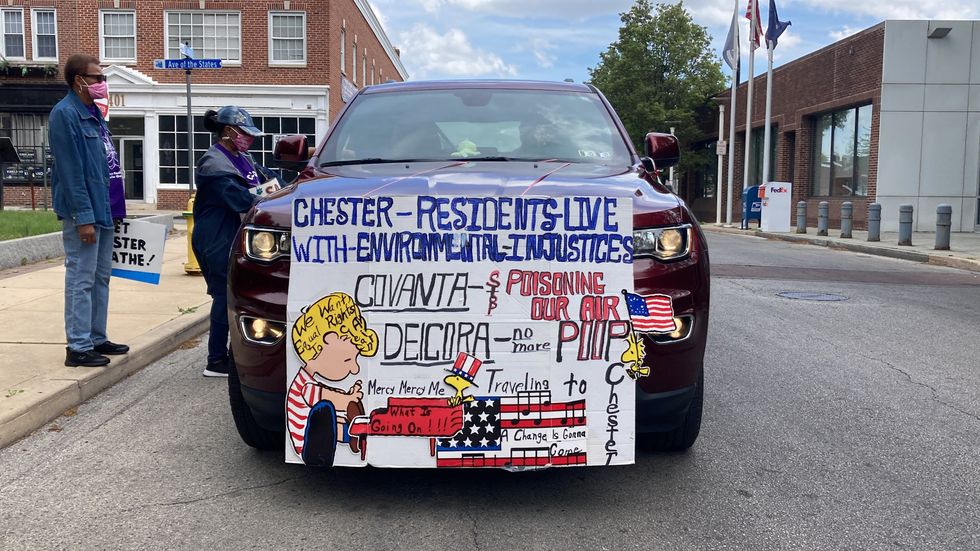
Penn America’s proposal, which was discussed with state and local officials for five years before the public learned about it, would build a liquefaction facility on 100 acres of land along the Chester waterfront to support the export of 7 million tons of LNG each year.
Credit: ctc you
For Chester resident Waites, the righteous anger exhibited by her fellow residents is a response to a pervasive sense that outside interests are destroying the community’s livelihood. She wants her family to stay in Chester and breathe clean air. She wants her neighbors to open their windows, sit on their porches and watch their kids play outside.
“I know how it feels to live decently and this is just not right,” Waites said. “We’ve been here all our lives. We could’ve left here, packed up, but this is our home.”
Mayfield looks across the river to Camden, New Jersey, which she calls a “sister city” to Chester, one that has navigated many of the same obstacles, including its own incinerator, and is on the rebound. She sees a city that has turned a corner, in part, by making its riverfront an area for entertainment. Placing an LNG terminal in Chester would all but foreclose on that potential.
“People are always drawn to water and we would like to tap into those possibilities. We’ve never had the ability to do that,” Mayfield said. “There’s a vision for Chester, but right now we’ve got to stop the bleeding.”
If you’re looking for more information about the proposed LNG facility, contact state Rep. Martina White, the task force’s Republican chair, or Chester Residents Concerned for Quality Living.


